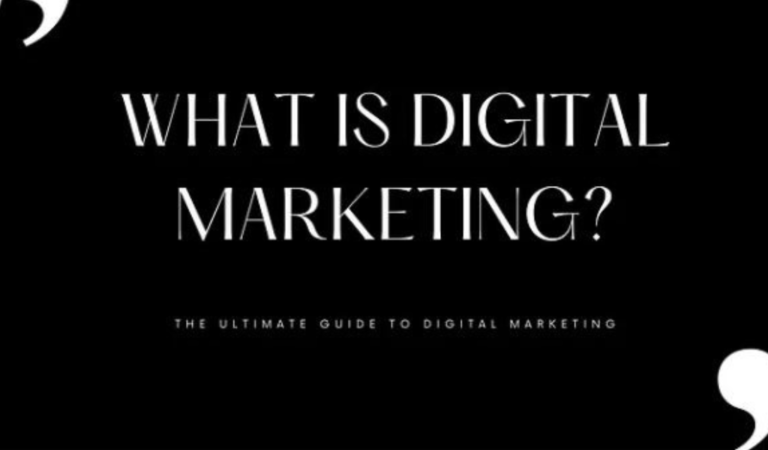Digital Marketing: A Beginner's Guide
In today's interconnected world, digital marketing has become an indispensable tool for businesses looking to thrive and grow in a competitive landscape. Whether you're a small startup or a large corporation, understanding the fundamentals of digital marketing is crucial to reaching and engaging your target audience effectively. This guide aims to demystify digital marketing, explore its key components, and provide actionable insights for beginners looking to embark on this exciting journey.
Digital marketing encompasses all marketing efforts that utilize electronic devices and the internet to connect with current and prospective customers. Unlike traditional marketing methods that rely on print ads or direct mail, digital marketing leverages digital channels such as websites, search engines, social media, email, and mobile apps to reach audiences in real-time.
Key Components of Digital Marketing:
Search Engine Optimization (SEO): SEO focuses on optimizing your website to rank higher in search engine results pages (SERPs) organically. This involves using relevant keywords, creating high-quality content, improving website performance, and earning backlinks from reputable sites.
Pay-Per-Click Advertising (PPC): PPC advertising allows you to bid for ad placement in search engine results or on websites. You pay a fee each time your ad is clicked. Platforms like Google Ads and social media ads on platforms such as Facebook, Instagram, and LinkedIn are popular PPC channels.
Social Media Marketing: Social media marketing involves creating and sharing content on social media platforms (like Facebook, Twitter, Instagram, LinkedIn, etc.) to achieve marketing goals. It includes organic posting, engaging with followers, running paid ads, and leveraging analytics to optimize performance.
Content Marketing: Content marketing focuses on creating and distributing valuable, relevant, and consistent content to attract and retain a clearly defined audience. Content can include blogs, videos, infographics, ebooks, and more, aiming to educate, entertain, or inspire the audience.
Email Marketing: Email marketing involves sending personalized messages to a targeted audience to promote products, services, or events. Effective email marketing campaigns can nurture leads, drive sales, and build customer loyalty through tailored content and automation.
Website Analytics: Website analytics tools like Google Analytics provide insights into website traffic, user behavior, conversion rates, and more. Analyzing these metrics helps marketers understand what's working and optimize campaigns for better results
A Beginner's Guide to Digital Marketing:
Set Clear Goals: Define specific and measurable goals for your digital marketing efforts. Whether it's increasing website traffic, generating leads, or boosting sales, clear goals provide direction and help evaluate success.
Know Your Audience: Understand your target audience's demographics, interests, behaviors, and pain points. Create buyer personas to tailor your marketing strategies and content to resonate with your ideal customers.
Optimize Your Website: Your website is the cornerstone of your digital presence. Ensure it's user-friendly, mobile-responsive, and optimized for SEO. Fast loading times, intuitive navigation, and compelling calls-to-action (CTAs) are essential.
Create Valuable Content: Content is king in digital marketing. Develop a content strategy that addresses your audience's needs and interests. Consistently publish high-quality content that educates, entertains, or solves problems to attract and engage your audience.
Embrace SEO Best Practices: Implement on-page and off-page SEO techniques to improve your website's visibility in search engine results. Conduct keyword research, optimize meta tags, create internal links, and earn backlinks from authoritative sites.
Utilize PPC Advertising: Start with a modest budget and experiment with PPC campaigns on platforms like Google Ads or social media channels. Target specific keywords, demographics, or interests to reach potential customers and drive traffic to your website.
Engage on Social Media: Build a presence on relevant social media platforms where your audience spends time. Share valuable content, interact with followers, run contests or promotions, and use analytics to refine your social media strategy.
Leverage Email Marketing: Grow your email list organically and segment your subscribers based on their preferences. Personalize email content, automate campaigns, and measure performance metrics like open rates and click-through rates to optimize results.
Monitor and Analyze Results: Regularly review analytics data to assess the performance of your digital marketing efforts. Identify trends, track conversions, and adjust strategies based on insights to maximize ROI and achieve your goals.
Stay Updated and Evolve:
Digital marketing is constantly evolving with new technologies and trends. Stay informed about industry updates, attend webinars, read blogs, and network with peers to stay ahead of the curve and continuously improve your strategies.
- In conclusion, digital marketing offers businesses powerful tools to connect with their audience, drive growth, and achieve marketing objectives effectively. By understanding the key components and implementing best practices, beginners can create impactful digital marketing campaigns that deliver results and propel their business forward in today's digital-first world.
- In conclusion, digital marketing offers businesses powerful tools to connect with their audience, drive growth, and achieve marketing objectives effectively. By understanding the key components and implementing best practices, beginners can create impactful digital marketing campaigns that deliver results and propel their business forward in today's digital-first world.
- In conclusion, digital marketing offers businesses powerful tools to connect with their audience, drive growth, and achieve marketing objectives effectively. By understanding the key components and implementing best practices, beginners can create impactful digital marketing campaigns that deliver results and propel their business forward in today's digital-first world.

